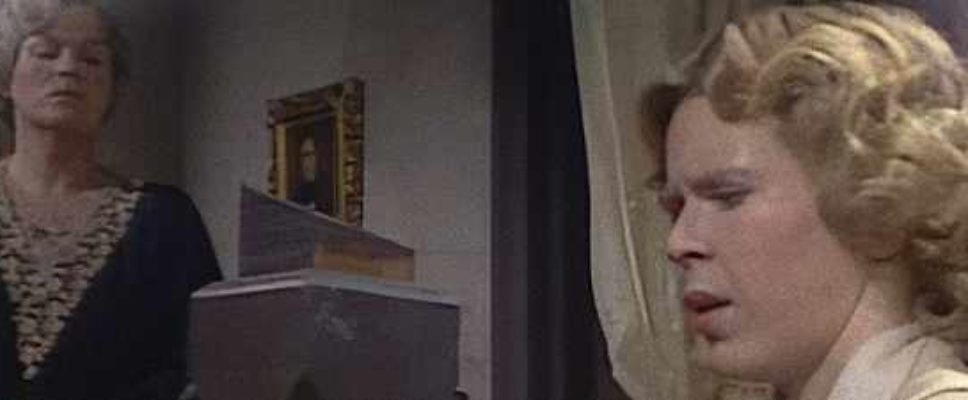Teresa Reviews “The Clergyman’s Daughter” (1983)
Teresa reviews “The Clergyman’s Daughter” and found it a charming adventure with a treasure hunt, hostage-taking, and mysterious doings.
Fidelity to text: 3 poltergeists
![]() The plot expanded, hotel guests checked in, boyfriend and fiancé made appearances, and a Hollywood ending was tacked on.
The plot expanded, hotel guests checked in, boyfriend and fiancé made appearances, and a Hollywood ending was tacked on.
Quality of movie on its own: 3 1/2 poltergeists
![]() I wanted more character development, especially of the cardboard fiancé, nonentity boyfriend, and Monica’s invisible mother.
I wanted more character development, especially of the cardboard fiancé, nonentity boyfriend, and Monica’s invisible mother.
Read more of Teresa’s Agatha Christie movie reviews at Peschel Press.
Also, follow Teresa’s discussion of these movies on her podcast.

This episode is the first one exploring the warmth and affection between Tommy and Tuppence. Previously, especially in the opening episode, Tuppence came across as a manic pixie dream girl, flapper division. It could be tiresome to watch and God knows, it would be tiresome to live with.
This time, she’s no longer as disdainful of Tommy’s intellect or drive as she has been in the past. They were charming to watch, especially when Tuppence was channeling her inner medium in fancy hired clothes and Tommy had to play her long-suffering, bill-paying husband.


A Prediction Fulfilled
Our story opens with Tuppence announcing — using her divination skills honed by years of guessing the future during Christmas Eve celebrations at the vicarage — that their next client would be a clergyman’s daughter, just like her.
Who should walk in but Monica Deane, former clergyman’s daughter. She’s impoverished and taking care of her invalid mother. That’s a problem but not why she showed up at Blunt’s Detective Agency. Neither is her inheriting a huge brick mansion that she can’t afford to maintain. She’s been taking in paying guests to make ends meet. It isn’t even the mysterious events where unseen hands throw the crockery about, scaring away the newly arrived guests.
No, what has her spooked is that strangers are pressuring her to sell the mansion, and they all sport the same sinister gold tooth and oddly shaped ears. Why would they do this? Could it be that her dead aunt, who was supposed to be wealthy yet left nothing but the house, had left something else behind?
The possibility exists. In the short story, Tommy charms the local bank manager, trading stories about silly elderly relatives who insisted on withdrawing all their money at the start of the Great War. In the film, Norman Partridge (worthy, rich but dull fiancé) passes along the information that the dear departed aunt had withdrawn all her money from the bank.
A Problem with Timing
This is where the timing gets weird, because the Great War had been over for a few years when Tommy and Tuppence took over the Blunt Detective Agency and the dearly departed aunt had to have cash to pay the bills for her mansion. Yet very little cash made its way into Monica’s hands. After she paid a few small legacies, all she had left was the house.
The film adds two couples who’re chased from the Red House by beds falling apart in the middle of the night and clothes ripped to shreds by unseen hands and crockery thrown violently across the room by someone who’s not there. Naturally, Monica must refund their money, putting her deeper into the hole.
That’s why she’s reassured when Tommy and Tuppence assure her they only charge a fee when the job is successfully completed.
What I wanted to see was more scenes with Monica’s fiancé and boyfriend. Maybe it’s the romance writer in me. What were they doing about Monica’s peril? As far as I could see, nothing.
Fiancé Norman Partridge was some kind of financial adviser. He’s rich, worthy, but Monica thinks he’s dull. But she’d be instantly better off by marrying him. He’d pay her bills and provide for her mother. But Monica’s dragging her heels.
My question is: What did Norman see in a destitute clergyman’s daughter with an invalid mother? As a well-off, socially secure member of the local community, Norman wouldn’t have to hunt for a wife. He wants Monica or he wouldn’t be there. Yet we get nothing. Nor does Norman seem concerned about flying crockery and vandalism. That also didn’t make any sense.
The Poor, Handsome Boyfriend
Boyfriend Gerald Rush is younger, handsomer, destitute, and an engineer so presumably he’s good with his hands. Monica fancies him because who doesn’t prefer poor and handsome to rich and ordinary? Gerald says virtually nothing, but stands around looking decorative. Like Norman, he doesn’t seem to mind that Monica is being menaced by paranormal activity. He’s not doing anything to investigate the situation either.

We do see the Mrs. Danvers-type housekeeper, Crockett. Crockett might as well have been wearing a sign saying “don’t trust me.” She also has a mysterious, yet unseen nephew. If you’re paying attention, you already know who the villains are and it isn’t Norman or Gerald trying to take over the Red House for nefarious reasons of their own.
The other servant Monica inherits is Frank Mulberry, the elderly gardener. He’s worked on the estate for years and knows where he buried the potatoes. He cheerfully takes Tommy’s money without telling Tommy what he wants to know.

It’s a light, fun episode, but it really would have benefited from more time spent with Norman and Gerald, especially if they had to duel with poltergeists for Monica’s favors.


